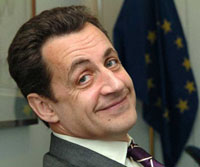Small candidates win spotlight as French presidential race formally begins
French voters woke up to very different airwaves Tuesday as the race for next month's presidential elections formally took off and each of the 12 candidates was granted equal broadcast time.

Campaign coverage leading up to the elections - considered pivotal for France, and the most closely watched in Europe this year - has so far focused largely on the top three or four contenders. That changed with the publication Tuesday of the final list of candidates, each receiving the same amount of TV and radio exposure.
A hunter championing rural traditions, a little-known Trotskyist and a far-right candidate who denounces what he calls "Islamization of France" landed TV interviews on top networks Tuesday.
None of the three - Frederic Nihous, Gerard Schivardi and Philippe de Villiers - is likely to win more than a few percent of votes in the first round election April 22. But hearing their voices on prime-time news is likely to shift the tone of the campaign.
All candidates are chasing the many undecided voters, uncertain about what they want for France's future after 12 years under President Jacques Chirac. The leading news programs have reported record attention this year, suggesting high interest in the campaign.
A poll Tuesday showed conservative Nicolas Sarkozy, who has cracked down on illegal immigration and youth crime and who pledges to free up the economy, maintaining a narrow lead over Socialist Segolene Royal, who would hike government spending for social programs, and Francois Bayrou, seeking a middle path between left and right.
The poll, by the LH2 agency, indicated Sarkozy had 29 percent support, Royal had 26 percent and Bayrou 22 percent. With the margin of error of 3 percentage points taken into account, the survey results indicated the race is still close.
Bayrou, a lawmaker with farming roots who has risen sharply from behind in recent weeks, brushed off suggestions Tuesday that he was peaking too fast, too soon.
"The principal problem in a campaign is when you don't rise at all," he told reporters, expressing optimism that he would make it into the May 6 runoff between the top two vote-getters in the first round.
Bayrou reached out to older voters - one of his weaker constituencies - with a pledge for pension reform and greater state aid for the elderly.
He warned of "the threat of a clash of generations, which risks tearing up the social fabric of France" if the government does not overhaul the pension system to respond to the graying population and shrinking youth.
Broadcasters complain that the equal-airtime rules, while well-intentioned, are near impossible to implement, especially for candidates who do not stage many public events, reports AP.
"Journalistically, it's not very inspiring, but democratically it's the least bad of systems," one of France's top TV anchors, Patrick Poivre d'Arvor, was quoted as saying in Tuesday's Le Figaro.
Subscribe to Pravda.Ru Telegram channel, Facebook, RSS!


